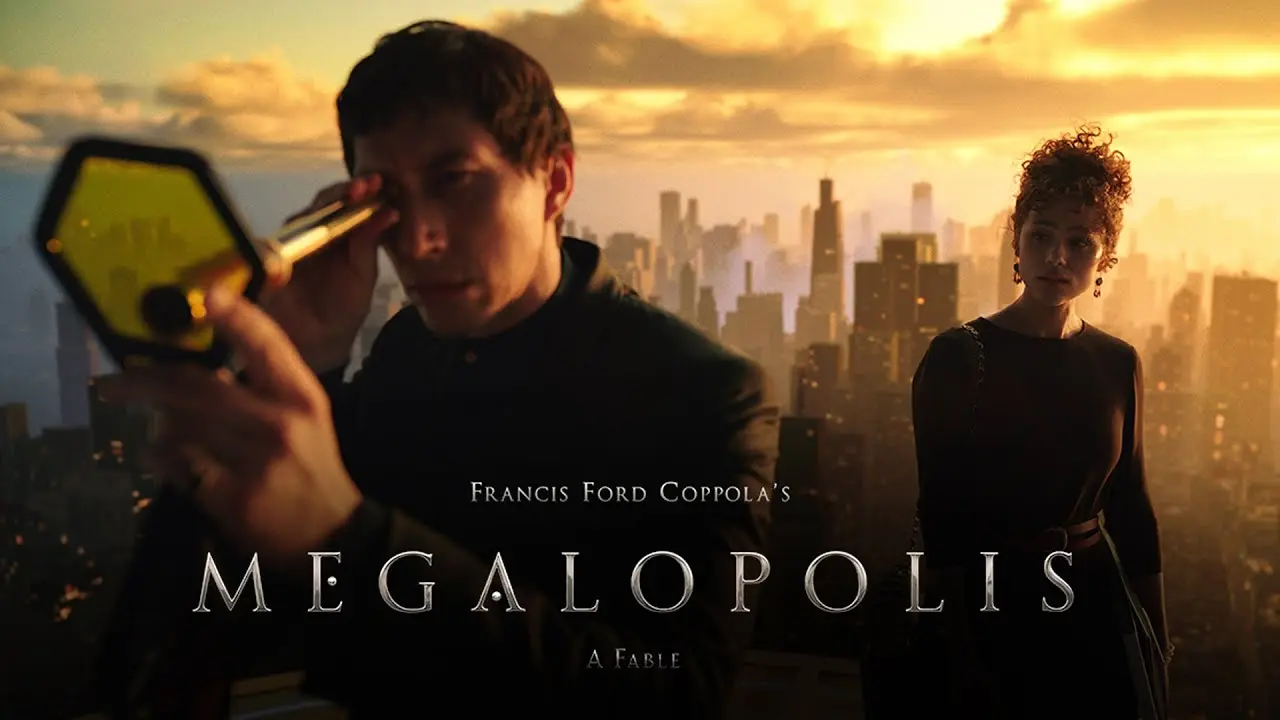Megalopolis (2024): A Bold, Flawed Vision of Epic Proportions

Francis Ford Coppola’s Megalopolis (2024) is a cinematic swing for the fences—a sprawling, ambitious epic that feels like a fever dream of Roman history, sci-fi grandeur, and philosophical musings. This isn’t a film that plays it safe; it’s a polarizing, messy masterpiece that demands attention, even if it doesn’t always land. As a longtime fan of Coppola’s daring storytelling, I dove into Megalopolis with high expectations and came away both dazzled and bewildered. Here’s my take on this audacious cinematic experiment.
A Roman Epic in a Futuristic Shell
Set in New Rome, a reimagined New York City, Megalopolis follows Cesar Catilina (Adam Driver), a visionary architect who can manipulate time and dreams of building a utopian city. His rival, Mayor Franklyn Cicero (Giancarlo Esposito), clings to a corrupt status quo, while Cicero’s daughter, Julia (Nathalie Emmanuel), becomes the emotional bridge between their clashing ideals. Inspired by the Catilinarian conspiracy of 63 BC, the film weaves a tale of ambition, love, and societal reinvention, wrapped in a visually stunning, often surreal package.
Coppola, the genius behind The Godfather and Apocalypse Now, funded this $120 million passion project himself, and his fingerprints are everywhere. The story feels deeply personal, reflecting his lifelong fascination with utopias and human potential. Yet, its narrative sprawl—juggling political intrigue, romance, and sci-fi elements—can feel overwhelming, like a novel’s worth of ideas crammed into 138 minutes.
Visual and Auditory Splendor
Visually, Megalopolis is a triumph. The production design blends ancient Roman aesthetics—think marble columns and togas—with a futuristic urban landscape. New Rome feels alive, from its glittering skyscrapers to its gritty underbelly, and the cinematography by Mihai Mălaimare Jr. captures it with breathtaking clarity. Whether it’s a sweeping cityscape or a surreal sequence of time-bending chaos, every frame is a work of art.
The score by Osvaldo Golijov is equally captivating, channeling the epic sweep of Ben-Hur and the emotional depth of Tchaikovsky. It’s a soundscape that feels inseparable from the film’s world, enhancing its dreamlike quality. Watching Megalopolis, I couldn’t help but marvel at how Coppola and his team created a universe so vivid it feels like you could step into it.
A Stellar but Uneven Cast
The ensemble is a draw, with Adam Driver delivering a commanding, eccentric performance as Cesar, equal parts genius and madman. Nathalie Emmanuel brings warmth to Julia, though her character feels underdeveloped. Giancarlo Esposito’s gravitas grounds the film, while Aubrey Plaza’s Wow Platinum, a scheming journalist, steals scenes with her campy energy. Shia LaBeouf, Jon Voight, and Dustin Hoffman round out the cast, but some performances—like LaBeouf’s over-the-top schemer—feel jarring against the film’s earnest tone.
The script doesn’t always give the actors enough to work with. Subplots, like a scandal involving Cesar’s cousin Clodio (LaBeouf), feel rushed, and character motivations can be murky. Yet, the cast’s commitment keeps you invested, even when the narrative stumbles.
Ambition Meets Chaos
Megalopolis is a film of big ideas—progress versus tradition, love versus power, art versus commerce—but it struggles to tie them together. The pacing is uneven, with moments of brilliance (a mid-film sequence where Cesar reshapes time is unforgettable) undercut by clunky dialogue and abrupt shifts. Coppola’s experimental touches, like breaking the fourth wall, add intrigue but can feel gimmicky. At Cannes 2024, where it premiered to a seven-minute ovation (and some boos), critics called it everything from “a visionary triumph” (IGN) to “a chaotic mess” (Variety).
On X, fans are equally split. @CinemaTweets1 raved about its “fearless ambition,” while @MovieBuff22 called it “a noble failure.” With a 38% Rotten Tomatoes score and a box office of just $14.3 million, Megalopolis hasn’t found a wide audience. Yet, like Apocalypse Now, it feels destined for reevaluation. Coppola himself compares the two, and I suspect time will be kinder to this film than its initial reception.
A Cinematic Experience Worth Wrestling With
Megalopolis isn’t an easy watch. It’s dense, sometimes incoherent, and unapologetically indulgent. But it’s also a rare film that takes risks most studios wouldn’t touch. Coppola, at 85, could have played it safe; instead, he made something fearless, flawed, and deeply human. I found myself frustrated by its narrative gaps yet captivated by its sheer audacity. It’s a movie that lingers, demanding you grapple with its ideas long after the credits roll.
For fans of bold cinema, Megalopolis is a must-see—not because it’s perfect, but because it’s unlike anything else. It’s a reminder of what movies can be when a director swings for the stars. I’m already looking forward to rewatching it, if only to unpack its layers. If you’re ready for a wild ride, Megalopolis is a journey worth taking.
Sources: IMDb, Rotten Tomatoes, Box Office Mojo, The Hollywood Reporter, IGN, Variety, and posts on X.
